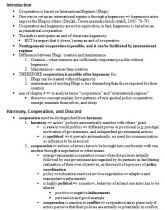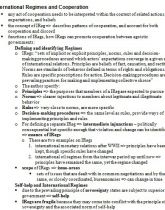Studijní materiál: Cooperation and international regimes
Skrýt detaily | Oblíbený- Kvalita:78,6 %
- Typ:Studijní materiál
- Univerzita:Univerzita Karlova v Praze
- Fakulta:Fakulta sociálních věd
- Kategorie:Humanitní vědy
- Podkategorie:Politologie
- Předmět:Mezinárodní vztahy
- Autor:clean.bandit
- Ročník:3. ročník
- Rozsah A4:3 strán
- Zobrazeno:770 x
- Stažené:0 x
- Velikost:0,1 MB
- Formát a přípona:MS Office Word (.doc)
- Jazyk:český
- ID projektu:9387
- Poslední úprava:09.01.2017
Introduction
• Cooperation is based on International Regimes (IRegs)
• One way to set up an international regime is through a hegemony => hegemonic actor impose the IReg on others (Drulák, Teorie mezinárodních vztahů, 2003: 78-79)
• Cooperation and hegemony are not in opposition, in fact, hegemony is based on an asymmetrical cooperation
• The author anticipates an and of American hegemony
• BUT he argues that it doesn’t mean an and of cooperation
• Nonhegemonic cooperation is possible, and it can be facilitated by international regimes
• Difference between IRegs’ creation and maintenance
1. Creation - when interests are sufficiently important possible without hegemony
2. Maintenance - easier than creation
• THEREFORE cooperation is possible after hegemony for:
1. IRegs can be created without hegemony
2. maintenance of existing IRegs is less demanding than those required for their creation
• aim of chapter 4 => to analyze terms “cooperation” and “international regimes”
• these two concept explain: how patterns of rule-guided policy cooperation emerge, maintain themselves, and decay
• Cooperation is based on International Regimes (IRegs)
• One way to set up an international regime is through a hegemony => hegemonic actor impose the IReg on others (Drulák, Teorie mezinárodních vztahů, 2003: 78-79)
• Cooperation and hegemony are not in opposition, in fact, hegemony is based on an asymmetrical cooperation
• The author anticipates an and of American hegemony
• BUT he argues that it doesn’t mean an and of cooperation
• Nonhegemonic cooperation is possible, and it can be facilitated by international regimes
• Difference between IRegs’ creation and maintenance
1. Creation - when interests are sufficiently important possible without hegemony
2. Maintenance - easier than creation
• THEREFORE cooperation is possible after hegemony for:
1. IRegs can be created without hegemony
2. maintenance of existing IRegs is less demanding than those required for their creation
• aim of chapter 4 => to analyze terms “cooperation” and “international regimes”
• these two concept explain: how patterns of rule-guided policy cooperation emerge, maintain themselves, and decay


